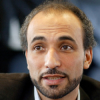Tariq Ramadan

Tariq Ramadan
Tariq Ramadanis a Swiss academic, philosopher and writer. He is the professor of Contemporary Islamic Studies in the Faculty of Oriental Studies at St Antony's College, Oxford and also teaches at the Oxford Faculty of Theology. He is a visiting professor at the Faculty of Islamic Studies, the Université Mundiapolisand several other universities around world. He is also a senior research fellow at Doshisha University. He is the director of the Research Centre of Islamic Legislation and Ethics, based in...
NationalitySwiss
ProfessionWriter
Date of Birth26 August 1962
CountrySwitzerland
Tunisia's responsibility, and especially that of its political and intellectual elites, is enormous. All the protagonists of the nation's social, cultural, economic and political life must work to overcome useless and counterproductive polarisation, and to find solutions to domestic, regional and international problems.
We need modesty not only in the way we dress; we need intellectual modesty.
To Islamize doesn't make sense to me. But to center, but to have intellectual empathy and modesty - all these dimensions are important on how we look at truth.
Intellectual modesty is humility as to what I know; intellectual humility is modesty as to what I do not know
What I'm advocating is an intellectual revolution - it's a different mindset concerning the ethical benchmarks by which we live.
I am not a politician. I have often been approached in this regard, but I have always declined these sorts of offers. I view myself as an independent, critical intellectual, as someone who tries to stimulate thought on the left and the right, to encourage intellectual evolution.
The more you look into and understand yourself, the less judgmental you become towards others.
I've never suffered because of my heritage in Europe.
While criticism of Israel is legitimate and justifiable, it cannot be an excuse - in any way, shape or form - for anti-Semitism.
Many U.S. organizations believe that I am being barred from the country not because of my actions but because of my ideas. The conclusion seems inescapable.
We've got to get away from the idea that scholars in the Islamic world can do our thinking for us. We need to start thinking for ourselves.
We all cherish freedom of speech, but with a reasonable approach and a reasonable use of it. If we come to this, it is a debate. If not, then it is a power struggle. Who is going to win, the Muslim principles or the Western principles?
It's clear there is nothing in my record supporting terrorism.
The 'army camp' that coordinates the agencies of our brain is vulnerable, both in itself and from within. In effect, he who can know and master its functioning and psychology from outside can become twice its master.